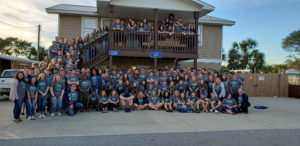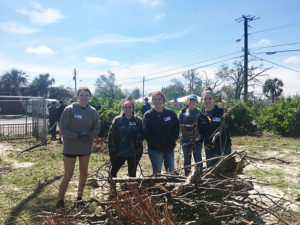Roughly 300 BCM students travel to Fla. for Beach Reach
By Ashley Perham
Baptist and Reflector contributing writer

BCM students from around the state gather for a picture during Beach Reach — a ministry that focuses on sharing the gospel with students on Spring Break trips.
PANAMA CITY BEACH, Fla. — Around 300 college students, including some from seven Tennessee Baptist Collegiate Ministries, spent a week in Panama City Beach spreading the gospel to college students visiting the area on spring break.
Through the Beach Reach program, college students and church groups share the good news of Jesus to spring breakers through free van rides at night and pancake breakfasts. The program lasts for three weeks in March.
Beach Reach started in Panama City Beach in 1996. However, the program has been going on since 1980 in South Padre, Texas.
Students can serve in several different areas throughout the week, including the van ministry, the pancake ministry, base, and the prayer room.
This year’s Beach Reach also added a disaster relief component to the work students did.
Panama City was hit by Hurricane Michael in October 2018, the strongest storm on record in the Florida panhandle. During the three weeks of Beach Reach, students will minister to 32 local schools affected by the storm.

BCM students Khya Allen (Carson-Newman), McKala Rollins (MTSU), Lauren Sexton (Carson-Newman), Sarah Grace White (Carson-Newman), Kalan Inman (Carson- Newman) clean up school grounds.
During a typical night of Beach Reach, spring breakers call in to request a free van ride from 9 p.m. until 2 a.m. Base workers assign a van to go pick up the spring breakers. Beach reachers try to use the van ride time to talk about Jesus with the spring breakers.
The base system has changed a lot in the past 20 years of Beach Reach.
Mark Whitt, campus minister at the Middle Tennessee State University BCM, said that in 1996, his first year at Beach Reach, vans communicated with base through high-powered walkie-talkies. Base used a white board to plot where all the vans were in the city.
Now, students answer phone calls from spring breakers and enter them into an online system. Base workers then text the van navigators information on where they are supposed to go.
Street teams also go out on the streets of Panama City Beach every night to try to have intentional conversations with people.
Asleigh Wilson, an MTSU sophomore, was on a street team one night. She said she liked that she could catch up with people, see the city, and pray for God to work in situations she sees.
Students also spend time in the prayer room where they can see a live feed of van assignments and prayer requests that are texted in from the beach reachers.
Kalan Inman, a junior at Carson-Newman University, said that she really enjoyed the prayer room.
“It was just amazing to think that so many people were praying for one person or whoever needed it,” she said.
Ellie Thomas, who runs the prayer room, said that seeing a salvation come through the prayer request feed is like an “immediate seeing God work” moment.
Every morning, students serve free pancakes at a local arcade in hopes that contacts from the previous night will come to continue gospel conversations.
Beach reachers also attend a worship service every night. The week’s speaker was Jason Hayes from Shoreline Church in Knoxville.
Hayes said that one way he saw God working during Beach Reach was through the balance of obedience and observation.
“When we obey what God’s called us to do — we’ve been faithful to take the gospel to the world to those that need Him — then that’s when we begin to observe some of the incredible things about what He can do in the lives of people,” he said.
Students also shared stories of how they saw God work.
“The Lord really worked last night in our van with the small things,” said Shelby Clement, a junior at Tennessee Tech.
She shared that some of their groups got split up, but they got to talk to more people individually and share the gospel with them.
She also shared that one spring breaker could not tell where he was staying and only had a screenshot of a dot to indicate where his house was. The van was able to find his house “almost immediately,” Clement said.
Bill Noe, director of Beach Reach, said that one of his favorite things about the event was seeing the impact it had on beach reachers.
“Probably my most favorite thing is what I see happen in the lives of beach reachers as they come to share Christ —some of them for the first time while they’re at Beach Reach — and then by the end of the week they’re super excited about going back to their own campus and their own communities and sharing Christ back home as well,” he said.
Whitley Allen, a sophomore at MTSU, said that seeing spring breakers convicted her.“It just really broke my heart seeing people not knowing their worth and just not realizing that there is hope and they can find it in Jesus,” she said.
Jaimee Headden, a junior at Tennessee Tech, said her favorite part of beach reach was the cooperation in sharing the gospel.
“I think it’s just working with others as a team and sharing the gospel and just motivating others to step out of their comfort zone and comfort others who are in need.”
Noe said that in the 20 years he’s been involved in Beach Reach, he has seen a technological change in the program, but also a shift in the spring breakers.
“When I was a college student and first came to Beach Reach and was sharing with students, there was almost more tension sometimes in conversations because I think a lot of students came with a Christian background so sometimes talking to us came along with the feeling of guilt,” Noe said.
“Whereas now 20 years later, more and more college students come to Beach Reach with no Christian background and so they’re really interested in talking about Christianity and learning about our beliefs because it’s not something they’re familiar with.” B&R
